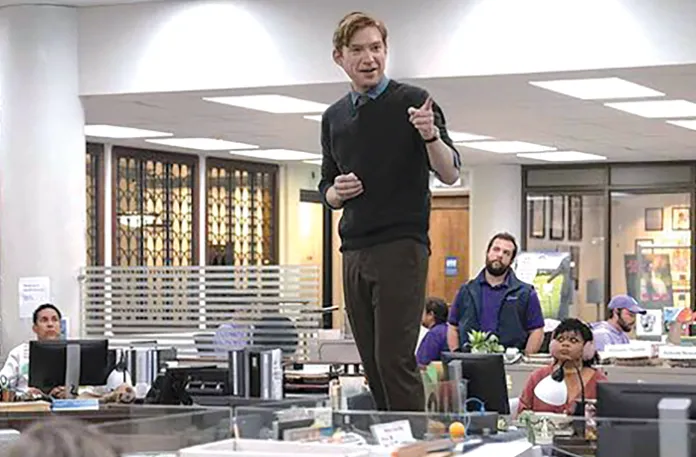“Nobody wants this!” Oscar Martinez of The Office insists to the documentary camera crew on the hunt for what became of the Dunder-Mifflin crew 12 years after the long-running program went off the air. “Don’t you guys have enough after nine years?”
Evidently, no, Oscar. We need more. Much more.
The Paper, which began streaming earlier this month on Peacock, is Office creator Greg Daniels’s encore, a reimagined single-camera workplace sitcom that basks in the glory of its predecessor, adapts many of its conceits to the post-COVID-19 employment landscape of the 2020’s, and reminds us that even dreary contemporary white-collar jobs in declining industries have their redeeming — and hilarious — moments. In short, The Paper doesn’t quite escape the shadow of its big brother, but that’s just fine with us.
The eponymous newspaper of the series is the Toledo Truth Teller, a once storied local outlet that covered politics, business, sports, and the arts in Northeast Ohio and beyond. It has since dwindled to a mostly online clickbait factory, copying and pasting wire stories, pumping listicles, and promoting sponsored products.

Indeed, the TTT has fallen so far that it’s been swallowed whole by Enervate, the cleverly named soulless private equity company that acquired Dunder-Mifflin, which “sells products made out of paper” and profits most handsomely from its Softees toilet-paper division. To add insult to injury, the newspaper’s staff of five now occupies half a floor in Enervate headquarters in downtown Toledo, a grand pre-war building that was once dedicated entirely to the paper.
Enter Ned Sampson, an ebullient, well-meaning, and overly earnest Softees salesman extraordinaire who’s transferred from Chicago to Toledo to run TTT. Played winningly by Irish actor Domhnall Gleeson of Ex Machina and The Force Awakens (and son of the great Brendan Gleeson) and affecting a believable midwestern accent, Ned nurses ambitious plans to revitalize the Truth Teller and do some “real journalism.”
But Ned immediately runs into three enormous obstacles: Ken Davies (a pitch-perfect Tim Key), a deeply insecure British corporate suit enlisted as Enervate’s chief strategist, denies Ned’s every budgetary request and quickly becomes his nemesis; the scene-stealing Esmeralda Grand (an outrageous Sabrina Impacciatore of the second season of The White Lotus), the fiery and impetuous managing editor whom Ned displaces, passive-aggressively undermines him at every turn; and a generally apathetic staff with virtually zero journalistic talent or experience; when asked about the Five W’s, one would-be reporter played by stand-up comic Alex Edelman asks, “Is that a gang?”
Slowly but surely, though, and with supreme awkwardness, Ned galvanizes the team. The non-stories they pursue at first, such as the lack of bodies in the city morgue, or parks and recreation officials occupying designated parking spaces, or high school drama teachers making unpopular casting decisions, gradually give way to actual scoops. More interestingly, the staff begins to spread its wings when granted opportunities to report. Ned successfully recruits to the reporting team secondary characters such as Nicole from circulation, Detrick from advertising, Travis from sales, and Adelola and Adam from accounting.
But the series’s most revelatory character is its audience surrogate, Mare Pritti (the charming Chelsea Frei, of The Moodys), a self-described “compositor” who characterizes her job as “pulling articles off the wire and ranking the arches on Love Islanders’ feet.” Mare served her country aboard an M1 Armored Vehicle, wrote for military newspaper Stars and Stripes, and, while skeptical that Ned can extract her and the paper from the doomscrolling, clout-chasing, empty-calorie hell into which it had descended (imagine articles like “You won’t Believe How Much Ben Affleck Tipped His Limo Driver”), she eventually comes to award him her trust.
Ned, too, develops over the course of the 10-episode season as he learns how to navigate office politics and the toxic relationship between Ken and Marv Putnam, Enervate’s CEO (the venerable Allan Havey, understated star of episode 7, “I Love You”). He presents a protagonist/antihero very different from Dunder-Mifflin’s stubborn, self-important, oblivious Michael Scott, but his interactions with the staff he leads are no less amusing.
Indeed, the only character from The Office that actually carried over into the new series is Oscar, who serves as the lead accountant for Softees but gets dragooned into reporting and constructing Sudokus for the paper. But echoes abound, and not just a brief glance at Bob Vance, of Vance Refrigeration, or a phone conversation with Stanley, who famously loved Sudokus, or Oscar’s mention of how he’s still “suffering [post-traumatic stress disorder] from an old boss,” or a winking reference to the Wayne Gretzky quote that Michael notoriously appropriated for himself.
For instance, the show, like its predecessor, is set in the epicenter of a dying business in a fading midsize industrial city. An all-hands meeting to discuss how to mark Pride Month evokes the infamous “Diversity Day” episode of The Office. And, lest we forget, the ads stippling the Peacock stream feature Angela, Darryl, Erin and Creed, and Ellie hawking AT&T Business.
Other tropes overlap between the shows, such as sexual tension and office romance among several characters, endless scheming and jockeying for office domination, and the staggering inability of coworkers to disentangle their personal and professional characteristics. Of course, these themes, along with the fourth-wall-breaking “[looks at camera]” screen direction, have now become de rigueur in what remains of the single-camera sitcom genre that Daniels pioneered. But at times, the series feels like fan service along the lines of “How would The Office handle #MeToo, catfishing, online trolls, and nasty high-school bloggers?” (Answer: with aplomb and wit.)
‘THE RAINMAKER’ EXPLORES WHAT IT TAKES TO MAKE JOHN GRISHAM BAD
At the same time, The Paper, in its own idiosyncratic way, adeptly explores actual issues of journalistic ethics, such as the delicate interplay of corporate ownership and editorial staff, including when TTT investigates Softees itself. The staff even sheepishly acknowledges the paper’s gathering and reselling of its readers’ data: “You could say we get more information from the readers than they get from us.” And in probably the series’ funniest episode, “Churnalism,” the staff confronts the noxious practice of “advertorials” when Ned assigns each reporter to personally test the ab-strengtheners, jawline-enhancers, and blue chemical face-peels; hilarity ensues.
In the end, those of us who still work in-person in a physical workplace in the presence of coworkers, whether for a consulting firm or a toilet paper company or a newspaper, well and truly appreciate the absurdities of the modern office: the petty politics, the uncomfortable relationships, the striving, the hijinks, the heartbreak, and, one hopes, the ultimate triumph. Daniels, Gleeson, Frei, and company have provided all of that in spades, and we should be grateful for their uproarious efforts, derivative or not.
Michael M. Rosen is an attorney and writer in Israel, a nonresident senior fellow at the American Enterprise Institute, and the author of Like Silicon From Clay: What Ancient Jewish Wisdom Teaches Us About AI.























